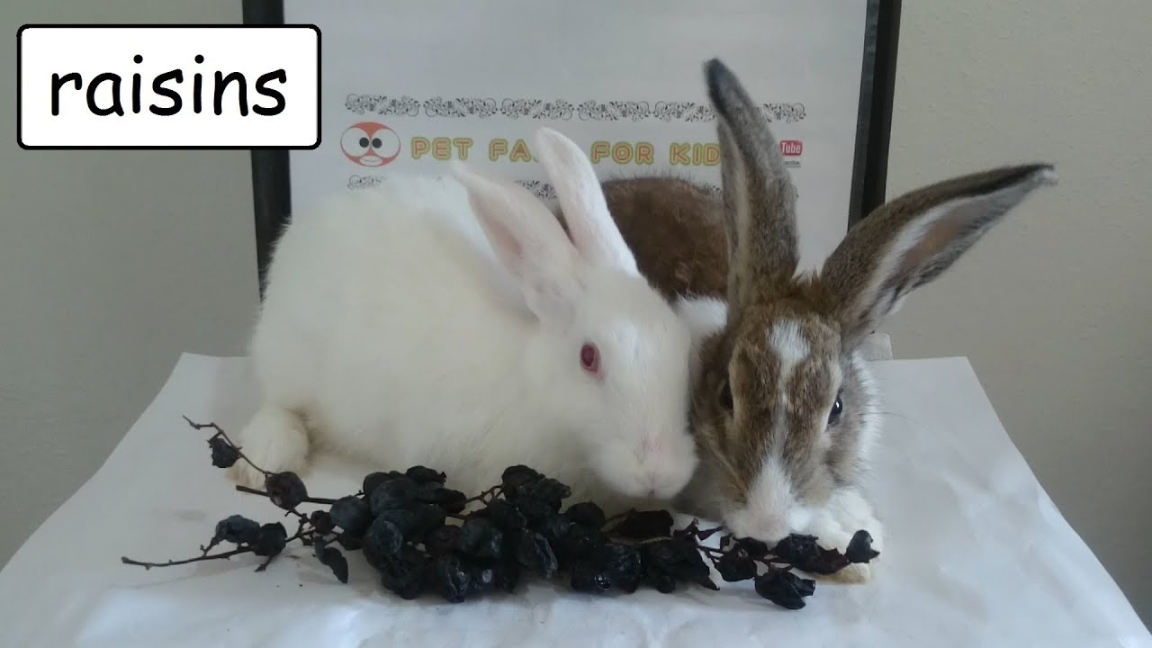Can Rabbits Have Raisins?
Rabbits are popular pets known for their adorable appearance and playful nature. As rabbit owners, it is our responsibility to ensure that our furry friends have a balanced and healthy diet. While rabbits can enjoy a wide variety of fruits and vegetables, it is important to be cautious about certain foods that may be harmful to their delicate digestive systems. One such food is raisins.

Why Are Raisins Potentially Harmful to Rabbits?
Raisins are dehydrated grapes, and while they may be a delicious and healthy snack for humans, they can pose potential health risks for rabbits. Here’s why:
- Sugar Content: Raisins are naturally high in sugar, which can lead to weight gain and obesity in rabbits if consumed excessively. Obesity can cause a range of health problems, including digestive issues, joint pain, and reduced lifespan.
- Digestive Issues: Rabbits have a sensitive digestive system that is specifically adapted to a high-fiber, low-sugar diet. Foods with high sugar content, such as raisins, can disrupt their delicate gut flora, leading to digestive issues like diarrhea and gastrointestinal stasis.
- Choking Hazard: Raisins are small and can pose a choking hazard for rabbits, especially if they are not properly chewed. This risk is higher for rabbits that tend to swallow their food quickly without adequate chewing.
What Happens if a Rabbit Eats Raisins?
If a rabbit accidentally ingests a small piece of raisin, it may not cause any immediate harm. However, consuming a significant amount of raisins can lead to various health problems. Some potential consequences of rabbits eating raisins include:
- Gastrointestinal Distress: The high sugar content in raisins can disrupt the balance of bacteria in the rabbit’s gut, leading to digestive distress. This may result in symptoms such as diarrhea, bloating, and stomach pain.
- Obesity and Weight Gain: Rabbits that consume raisins regularly are at risk of becoming overweight or obese. This can have serious health implications and may require dietary changes and increased exercise to manage their weight.
- Choking: As mentioned earlier, raisins can pose a choking hazard for rabbits, particularly if they are not properly chewed. This risk is higher for rabbits that are prone to eating quickly.
Alternatives to Raisins for Rabbits
While raisins may not be suitable for rabbits, there are plenty of other rabbit-friendly treats and snacks to indulge them with. Consider offering the following alternatives:
- Leafy Greens: Rabbits love leafy greens such as parsley, spinach, and lettuce. These are low in sugar and high in nutrients, making them a healthy and tasty option for your furry friend.
- Herbs: Fresh herbs like cilantro, basil, and mint are not only flavorful but also safe for rabbits. They can be given in small quantities as an occasional treat.
- Carrots and Bell Peppers: Carrots and bell peppers are crunchy and nutritious snacks for rabbits. Just remember to feed them in moderation, as they are higher in sugar compared to leafy greens.
Remember, a rabbit’s diet should primarily consist of hay, fresh water, and high-quality pellets. Treats like fruits and vegetables should only be given in small amounts to maintain a balanced diet.
Frequently Asked Questions (FAQs)
1. Can rabbits eat grapes instead of raisins?
While grapes are potentially less harmful than raisins, they should still be fed to rabbits in moderation. The high sugar content in grapes can lead to similar health issues, so it is best to offer them only occasionally and in small quantities.
2. What are the signs of gastrointestinal distress in rabbits?
The signs of gastrointestinal distress in rabbits include diarrhea, bloating, reduced appetite, and a lack of bowel movements. If you notice any of these symptoms, it is important to consult a veterinarian for proper diagnosis and treatment.
3. How often can I give my rabbit treats?
Treats should be given sparingly to rabbits to avoid disrupting their balanced diet. As a general guideline, treats should make up no more than 5% of a rabbit’s daily food intake. This ensures that they receive the necessary nutrients from their primary diet of hay, pellets, and water.
4. Are there any other foods I should avoid feeding my rabbit?
Apart from raisins, there are several other foods that should be avoided when it comes to feeding rabbits. These include chocolate, onions, garlic, potatoes, and any other high-sugar, high-fat, or toxic foods. It is always best to research and consult a veterinarian before introducing any new foods into your rabbit’s diet.
Related Articles…
Copyright Notice:
Images displayed on this website are not our property, but are procured from the internet. If you hold copyrights to any image and wish for its removal, please get in touch with us.